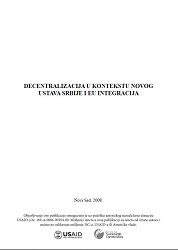
DECENTRALIZATION IN THE CONTEXT OF THE NEW CONSTITUTION OF SERBIA AND EU INTEGRATION
DECENTRALIZACIJA U KONTEKSTU NOVOG USTAVA SRBIJE I EU INTEGRACIJA
Keywords: decentralization; EU integrations; Serbia; Constitution
More...
Keywords: decentralization; EU integrations; Serbia; Constitution
More...
Keywords: Constitution; constitutional framework; Serbia
More...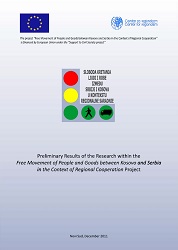
Keywords: international relations; Serbia; Kosovo; regional cooperation; free movement; trade
Draft version of the project focused on freedom of movement of people and commodities between Serbia and Kosovo in the light of regional cooperation was made back in November 2010. At that time, there were no indications that there was going to be a dialog between Belgrade and Pristina in Brussels, or when this dialog was going to be held. First subject on the agenda of these negotiations was also unforeseeable ‐ freedom of movement of people and commodities, an issue that later on in summer 2011 caused dramatic events in North Kosovo. In early February, draft version of this project was presented to certain EU officials in Brussels, who then suggested the Center for Regionalism as the proponent of the project to approach the EU Delegation in Belgrade which was at that time publishing a call for proposals with fitting propositions for given project's subject. Project was approved by the EU Delegation in late June and activities began in early July, when Belgrade‐Pristina negotiations in Brussels were well on their way, where issues targeted by this project were addressed at the very beginning. In early stages of project realization, expert team was formed, with following members from Serbia: ‐ Predrag Bjelić, Ph.D., Associate Professor University of Belgrade Faculty of Economics expert in the field of movement of goods ‐ Bisera Seceragic, economist, expert in the field of grey economy ‐ Vladimir Petronijevic, project consultant, segment on the freedom of movement of people Following experts from Kosovo were engaged in this project: ‐ Doruntina Vinca, BA Anthropology and Political Science, segment on the freedom of movement of people ‐ Hajrulla Çeku, MA, lecturer of Local Government and Politics, segment on the freedom of goods They jointly worked on data collection and processing in regard of freedom of movement of people and commodities. Main goal of expert team's work was to create a report which includes recommendations for Governments in Belgrade and Pristina, and for EU as a mediator in these negotiations.
More...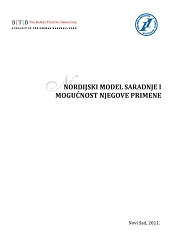
Keywords: The Nordic model of cooperation; regional cooperation; Western Balkans;
Regional cooperation in the Balkans, and particularly within the ”Dayton Four“, made a significant progress in recent years. It was particularly driven by a more decisive trying for war crimes, being a key assumption of reconciliation following the conflicts in earlier periods, a more efficient joint fighting crime and corruption – through a much better cooperation of judicial bodies and the police of the countries of this reigon, better economic linking and a more successful economic cooperation by turning the region in a free-trade zone, as well as an overall progress of all countries in European integration process which itself enables and encourages such cooperation. The prevailing context of regional cooperation significantly improved, and in particular the overall political climate, as well as the political will of the leading political figures to have good relations with neighbours. In spite of undoubted results, many of which were inconceivable only a few years ago, some old barriers to regional cooperation still exist, along with some new ones that were created meanwhile. Disagreements regarding the status of Kosovo and the constitutional solutions in Bosnia and Herzegovina are the best, i.e. the most difficult to overcome examples of old barriers, whereas the economic protectionism and again growing political nationalism, as consequences of bad responses to the current economic crisis – are the examples of the new ones. Neither earlier nor recently a satisfactory answer to old problems that cooperation in a region encounters following a promising growth, was not found. It is about an insufficient coordination of numerous initiatives and organisations, as well as about often vague priorities cooperation is to be governed by. There is a growing awareness that a regional cooperation is on a sui generis crossroad. Although the existing forms of cooperation and integration have not been fully utilised, there is a growing need for a new approach which would be a strong impetus both for the existing and possible new forms and ways of cooperation. Therefore, it is not about initial steps, which we all together, luckily, left behind us long time ago, but about a transition to an advanced, higher and a higher quality phase
More...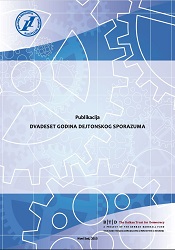
Keywords: The Daytona agreement; international relations; Bosnia and Herzegovina; Western Balkans
More...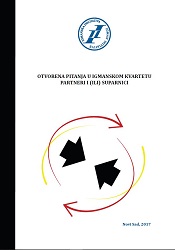
Keywords: Western Balkans; international relations; regional cooperation; Igmanski quartet
The basic, key issues that dominate relations in the region can be enumerated as follows: borders, succession of the former SFRY, status and property issues, missing persons, prosecution of war crimes, position of national minorities. The order does not indicate importance, it is subject to change and depends on the angle of observation. Also, the list is not exhaustive. Because, for some countries, the issue of refugees (and internally displaced persons) is an acute problem, which applies to Serbia, but also BiH.
More...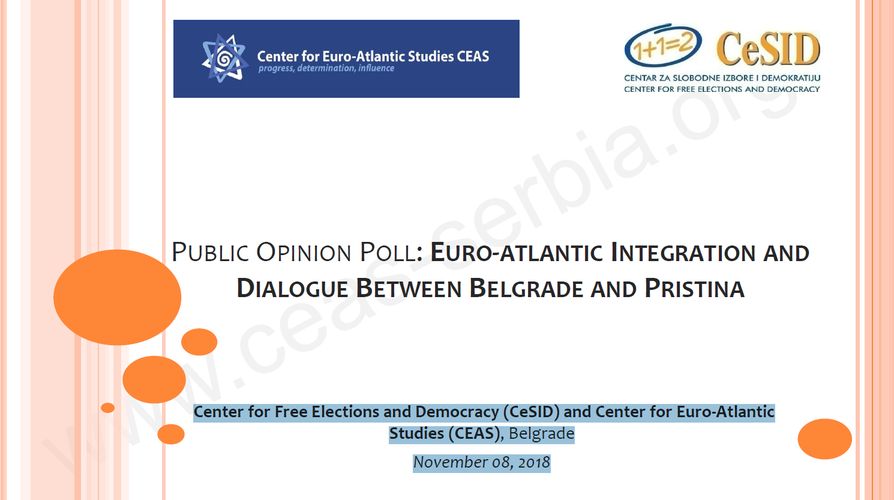
Center for Free Elections and Democracy (CeSID) and Center for Euro-Atlantic Studies (CEAS), BelgradeNovember 08, 2018
More...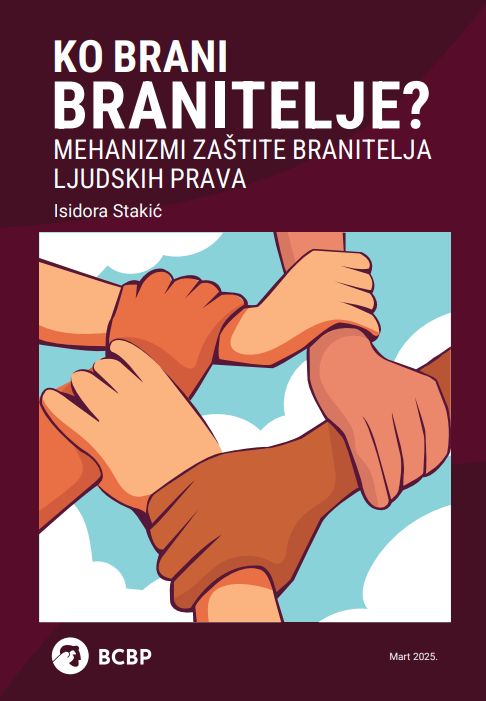
Keywords: Human rights; Colombia; Mexico; DR Congo; Philippines; Turkey; Serbia; defamation campaigns; legal persecution
Human rights defenders are people who act independently or jointly to improve human rights and basic freedoms and fight for their protection at local, national and international levels. As a rule, defenders' activities run counter to the interests of the powerful, be it governments or private corporations, and therefore need protection. This study analyzes legal and institutional instruments for the protection of veterans at the international level and in six countries: Colombia, Mexico, DR Congo, the Philippines, Turkey and Serbia. In these countries, human rights defenders are in a difficult situation, in which they face numerous threats and pressures - from police repression, through defamation campaigns to legal persecution. Therefore, these are countries where there is a need for additional protection of veterans, but (still) a significant gap between the normative level and practice.
More...
Keywords: Ecological degradation; climate changes; environmental protection; extreme groups; environmental initiatives; eco-terrorists; eco-extremists
Ecological degradation and climate changes in the past decades have caused the growing concern of citizens and the formation of many movements for environmental protection. However, along with legitimate activism, radical and extreme groups have emerged that use violent methods to advance their goals. In recent years, there has also been a significant increase in environmentally motivated violent incidents, which can lead to the delegitimization and criminalization of justified environmental initiatives. Serbia is no exception in this regard. Thus, in the last few years, environmental initiatives have appeared that oppose lithium mining in Serbia, which the authorities called eco-terrorists and eco-extremists in order to discredit them. Therefore, it is important to clearly distinguish radicalism from extremism in order to support democratic activism while preserving community safety.
More...
Keywords: protean power; international relations
The concept of protean power is a new concept in international relations. It was designed by Peter Katzenstein as a response to the traditional concept of control power. This concept got its name "proteus" after the Greek god of the sea, Proteus, who was known for his gift of predicting the future, but also for avoiding giving answers to queries by changing his shape, so he predicted the future only to those who would manage to catch him. So Proteus often left the other party in suspense. Proteian power is exactly like that, because it tries to take advantage of uncertainty and to adapt to the new situation.
More...
Keywords: Public Prosecutor's Office; North Macedonia;
The Special Public Prosecutor's Office (hereinafter SPO) in North Macedonia was established by the Law on Public Prosecution for criminal prosecution in cases related to the content of unauthorized interception of communications in 2015 (hereinafter the Law on SPO). This prosecutor's office was established after a series of scandals involving the illegal wiretapping of thousands of political and state actors, which revealed a high level of corruption in the country. Then-opposition leader Zoran Zaev released a series of audio clips - what he called "bombshells" - in which top government officials are heard planning to rig votes, buy off judges and punish political opponents. It was established as a temporary institution where the Law on SPO is valid for 5 years from its adoption and can be extended once every subsequent year (for one year) by a two-thirds majority vote in the Parliament if there is a need for it. The law also stipulates that the function of the SPO ends upon completion of all investigations and prosecutions within its mandate.
More...
Keywords: Special Prosecutor's Office; corruption; Romania
The National Anti-Corruption Directorate (DNA) was established in 2002 by a Romanian Government Decree with the aim of reducing the level of political and high- and middle-level corruption in Romania. In terms of organization, the DNA functions as a special department within the Supreme Prosecutor's Office at the Higher Court of Cassation. Therefore, the Directorate, as a part of the Supreme Prosecutor's Office, is formally managed by the Supreme Prosecutor of Romania, but the Supreme Prosecutor of the Directorate is at the head of the DNA, who has the authority to manage and coordinate all activities of the DNA. Funds for work are provided from the state budget, within the allocation for the Supreme Prosecutor's Office. The functions of a prosecutor, judicial police officer or specialist within the DNA are incompatible with any other public or private function, except for the position of teacher in higher education institutions.
More...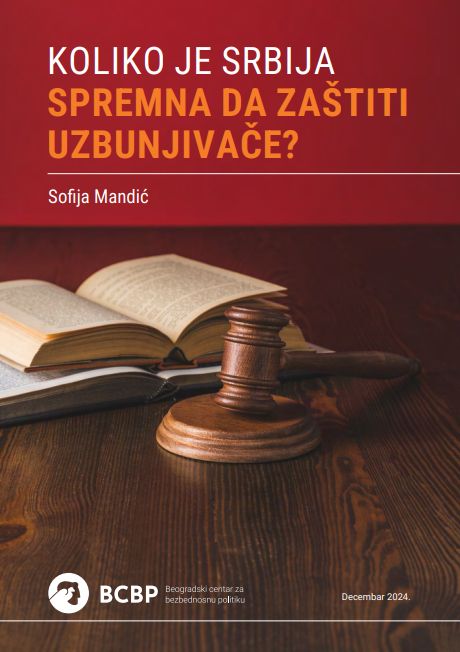
Keywords: Serbia; whistleblower; judicial protection
In 2024, Serbia will mark ten years since the adoption of the Law on the Protection of Whistleblowers. During the past decade, there was no serious and comprehensive assessment of its application by the Serbian authorities, and despite declarative statements and assumed strategic commitments, the protection of whistleblowers never became a real political or judicial priority in Serbia. The report "How ready is Serbia to protect whistleblowers?" analyzes and evaluates the performance of institutions for the protection of whistleblowers, presents the outcomes of cases in which whistleblowers have sought judicial protection, and identifies strengths and weaknesses in practices that lead to good or unsatisfactory case outcomes.
More...
Keywords: Ukrainia; Ukrainians; Russian occupation
After the first wave of Ukrainian migration to Europe and America that marked the 20th century, today the Ukrainian community faces new challenges. It is the latest wave in which millions of Ukrainians were forced to leave their country first because of the annexation of Crimea and the Russian occupation of parts of the eastern regions of Ukraine in 2014, and eight years later and because of the war that the Russian Federation started and is waging on the entire territory of Ukraine from February 2022 today.
More...




